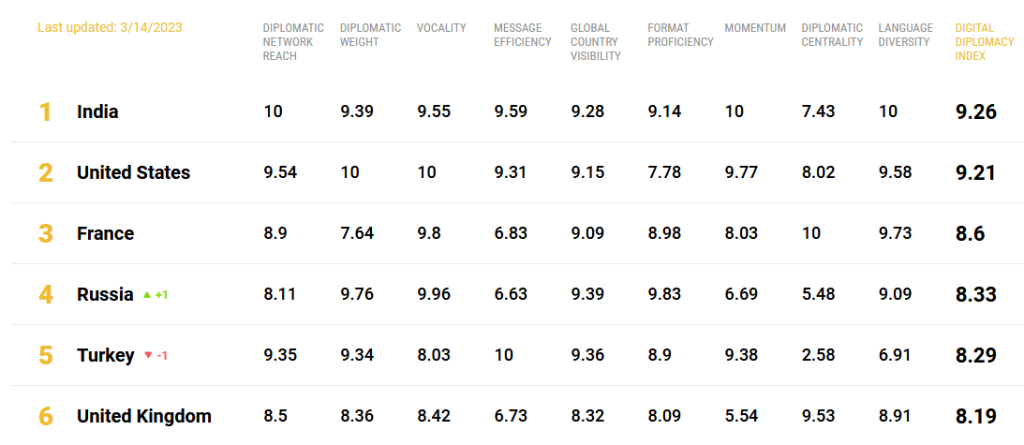As the world continues to evolve in the digital age, diplomacy must adapt to the shifts in how people communicate. Digital diplomacy has emerged as a fundamental component of contemporary diplomacy due to the widespread use of social media platforms and internet tools. One way to measure a nation’s performance in this area is through the Digital Diplomacy Index.
The primary objective of this phenomenon is to furnish an accurate and unbiased assessment of the performance of major global powers in the realm of online international affairs. The Index facilitates a comprehensive comprehension of the novel online milieu, empowers nations and diplomatic organizations to identify pertinent issues, evaluate their relative position vis-a-vis their counterparts, and document emerging trends in online diplomacy.
The Digital Diplomacy Index uses several criteria to rank G20 countries in the area of digital diplomacy, including Global Country Visibility, Format Proficiency, Momentum, Diplomatic Centrality, and Language Diversity. Other important factors considered by the index are Diplomatic Network Reach, Diplomatic Weight, Vocality, and Message Efficiency. The index updates its data daily and includes the official Twitter accounts of G20 nations in its analysis.
The most recent update of the Digital Diplomacy Index reveals that India, the United States, France, and Russia are the top four nations. India takes the lead with an overall score of 9.26 out of 10, followed by the United States with a score of 9.21. France is ranked third with a score of 8.6, while Russia has moved up one position from the last update and is now ranked fourth with a score of 8.33. These countries have achieved high scores in various criteria such as Vocality, Diplomatic Network Reach, Global Country Visibility, and Diplomatic Weight.

The Digital Diplomacy Index is a great instrument for states and diplomatic organizations to comprehend and analyze their performance in the new online environment they are exposed to, pinpoint problems, and record emerging trends that influence online diplomacy. It can serve as a guide for countries to attain this goal. Behind the entire project stands the Reputation Squad agency, providing accurate and objective measurement of the performance of world powers on the emerging stage of online international affairs. As the digital landscape changes, governments must continue to adapt in order to be relevant in the field of digital diplomacy.